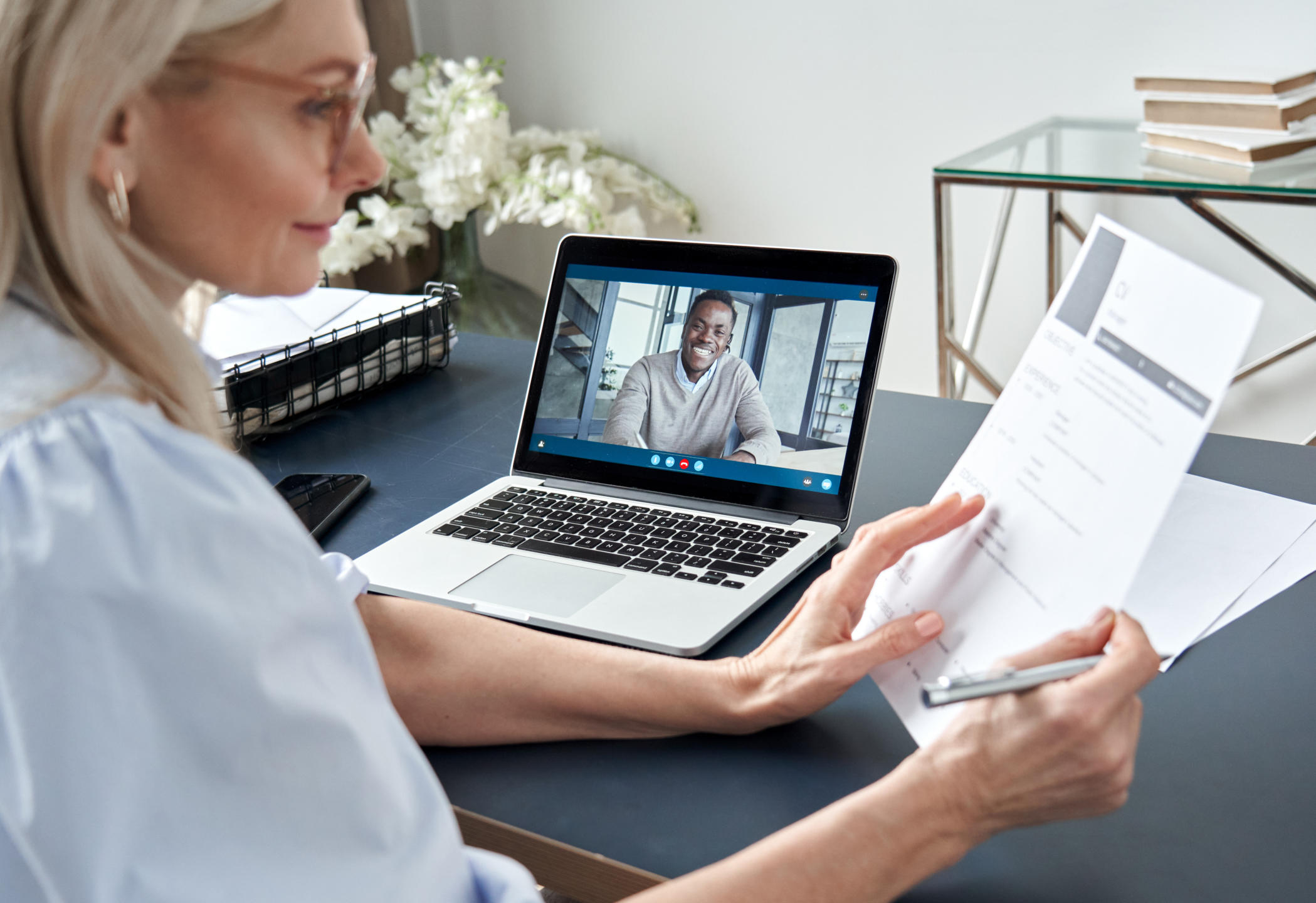Many businesses have switched to conducting job interviews online as a result of the Covid-19 pandemic. As a result, you must be aware of both the right and wrong things to do in order to succeed in your virtual interviews. Here are the most crucial dos and don’ts for succeeding in a virtual interview.
What are the don’ts of virtual interviews?
Don’t forget to finish with a question.
Always ask a question at the end to demonstrate an interest in the role and business. These are acceptable examples of common interview questions:
- “How would you characterize someone as successful in this position?”
- and “What is the most crucial duty of this position?”
However, you can also bring up specifics that were brought up in the virtual interview when you ask questions. Of course, never bring up PTO, salary, or benefits during a job interview, whether it be in person or online.
Don’t miss the practice round.
Some virtual interviews take place in real-time, with the interviewee and interviewer talking to each other. Some, though, have the person being interviewed record their answers to questions that are shown on the screen. Most interviewing services will offer you a practice round if you need to record your responses, and you should always use the practice round to iron out any kinks before the actual recording begins.
Don’t wear a casual outfit.
There is a chance that the interviewer won’t be able to see everything you are wearing because it is a virtual interview. Even so, you should still present yourself professionally, just as you would for a face-to-face interview. Additionally, you must put on some sort of “interview”-appropriate clothing (yes, that means even pants or a skirt!) By dressing up, you can convey to the interviewer that you are taking the interview seriously. In addition, dressing up will increase your confidence and help you focus on the task at hand—acing your interview—even if the interviewer can only see you from the waist up.
Don’t depend on notes.
You should research the organizations and positions you’re interviewing for in order to be prepared for interviews, whether they are traditional or virtual. That said, if you took notes while conducting your research, be careful not to look at them or any other written materials while conducting your virtual interview. Why? Because your interviewer will notice if you’re looking away from the screen. And even if you only take a brief moment to look down, that will still be true, which will hurt your chances of moving forward in the interview as you appear ill-prepared or distracted.
What are the do’s of virtual interviews?

Do follow up with an email after the interview.
It’s customary to send a thank-you email following a traditional interview, and this practice applies equally to virtual interviews. It’s crucial to send a thank-you email after the interview because it gives you another chance to highlight your qualifications and why you are the best candidate for the position. Additionally, it’s a fantastic way to remind them of your interview. But remember that if you took part in a virtual panel interview, you should send separate emails to each interviewer rather than sending one email to the entire group.
Do download programs in advance, and check that your hardware is in good working order.
If you are invited to a virtual interview, you should determine whether any programs need to be downloaded in advance. Being late for a virtual interview because you were still downloading the necessary program is one of the best ways to leave a bad impression. What this means is that you should also do a test run with your tools if you can to make sure the internet connection, audio, and video are all functioning properly.
Do plan the interview for a time when your house will be quiet.
If you can, try to plan your virtual interviews for when your home will be as quiet as possible.
- If you have young kids, for instance, consider when they might need your attention and avoid scheduling your interview then
- Alternatively, if you have a dog, be careful not to schedule your interview when it’s time for a walk.
In any case, make your home as quiet and distraction-free as you can, regardless of the time your virtual interview takes place. Make sure your phone is silent and turn off any external sounds in the area, such as speakers, televisions, etc.
Do prepare for interviews by practicing the questions.
To sound polished and professional, just like in a conventional interview, you should practice answering interview questions. You should be ready for all common interview inquiries, such as:
- “What are your greatest strengths and weaknesses?”
- and “Tell me about a time you handled conflict while working on a team.”
Additionally, you should have given careful consideration to your reasons for wanting the particular job and how your skill set will fit into it.
How should you behave in a remote interview?

It doesn’t make your interview any less legitimate just because it’s taking place on Skype (or another platform). You still need to get ready the same way you would if you were going into the office, aside from making travel arrangements for the interview. This entails:
- Doing background research on the organization and the position
- Getting ready for typical interview questions
- and thinking of questions to pose to the interviewer.
Always be prepared to explain why you are the best candidate for the position being sought after. Your interviewer is still trying to find someone they can imagine themselves working with who is enthusiastic and knowledgeable about the position being sought after. If you’ve never used video chat before, you might find it hard to talk at first, especially if you can see yourself on the screen. That’s why scheduling a practice video interview with a friend or career coach can help you identify any issues you should be aware of. It’s possible that you have a tendency to turn your back on the camera or that your natural hand motions are too low to be seen. Recording your practice is another suggestion. You’ll be able to tell if you’re making eye contact, fidgeting with papers, or having poor posture when you play it back. After that, make adjustments accordingly. Eloise Eonnet, a career coach at Muse who specializes in public speaking, presentation, and communication skills, says it’s important to prepare for interviews by answering questions the same way you would in a real one, especially when it comes to talking about important parts of your background. To avoid stumbling over them or saying them incorrectly out of nervousness, Eonnet advises against saying the names and numbers you must say aloud for the first time during the interview.
Is it frowned upon to look at notes throughout a video interview?
During a video interview, it can be tempting to have a lot of information in front of you because your interviewer can’t see what’s on your desk (or screen). Take care, though. We suggest only keeping a few quick notes in front of you and only skimming them occasionally. Write down important numbers and other small pieces of information, but not whole answers. Plus, attempt to avoid sounding like you are simply reading. Eonnet also advises against keeping any notes in your line of sight. The best interviews involve conversation, and taking notes can end up being a crutch, she says. A big part of why someone chooses to hire you is because they think you connected with them during the interview, which can be challenging to do if you’re preoccupied with shuffling notes. Make sure you also have them available during your practice interviews if you plan to bring some brief notes with you. This will not only let you know if you can use them without breaking the flow of the conversation, but the more you go over them, the less you’ll need to use them.
How do you prepare for a 15-minute Zoom interview?

This is crucial for any interview, but it’s important to approach your video interview like a conversation because that’s the only way you can establish a bond. Building rapport during your interview is vital because you won’t have time to do so before or after the interview. So, show more warmth and be authentic. In other words, you should maintain your professionalism while still speaking as though you were speaking to a close friend. Another key piece of advice is that a video call should not just be questions and answers, says Eonnet. Feel free to add additional information to the interviewer’s comments after they address your questions. Additionally, instead of waiting until the end of the conversation to ask questions, interject your own whenever it is appropriate. Instead of just reading a list of questions to you during the interview, you want the interviewer to feel comfortable talking to you on a daily basis.

